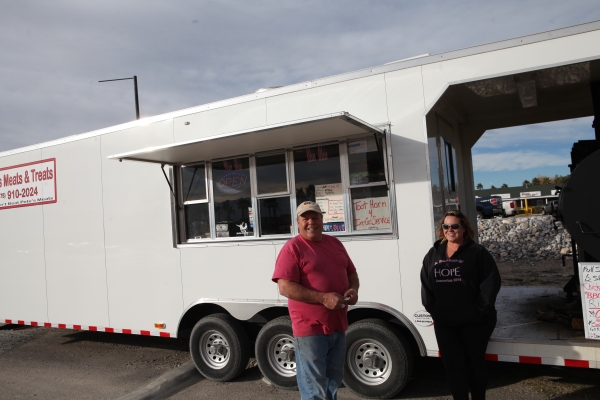Mobile food vending regulations closer to code
Mobile food vending requirements are on the way to becoming part of the Nye County code after a four-month debate on how to better regulate Pahrump mobile vendors.
The proposed set of rules was approved by the Pahrump Regional Planning Commission on Wednesday. It was originally drafted by a mobile food vending subcommittee that had been assembled after the Nye County Planning Department received several complaints from brick-and-mortar restaurants in Pahrump.
"One of the complaints that we had received very early on, one of the original complaints that we received was from a brick-and-mortar restaurant that a mobile food vendor was parked like practically next door (to)," Nye County Planner Beth Lee said. "So, in the absence of having a code that does put a limit on it, we don't have a way to enforce a separation. So, it was a suggestion to at least give a little bit of separation between the mobile vendors and brick-and-mortars."
According to the proposed requirements, a mobile food vending unit shall not be stationary in one location for more than a maximum of 12 hours in every 24-hour period. Mobile food vendors that want to operate along Nevada Highway 160 or Nevada Highway 372 shall apply for a conditional use permit and shall maintain a minimum separation of three hundred feet from the entry door of any existing restaurant.
Pahrump vendor Jeanne Wright, who sells hot dogs along Nevada Highway 160 during lunch hour, said the proposed restrictions didn't seem "right" to her.
"I don't have a problem following any rules, as long as they are reasonable rules for everyone," she said. "I do kind of feel like this is much ado about nothing. Yes, absolutely, let's have a code, let's make it work for everyone. Let us succeed or fail on our own. Like every other business does."
Commission Secretary Bob King said he didn't see a need for the change and called it "a waste of effort."
"To me, this seems to be a solution in search of a problem. I don't see a need for this," he said. "We haven't had any problems up to now. I don't see great hoards of food wagons coming over the hill or anywhere setting up on every street corner."
Lee however noted that regulations address property owner and liability concerns that were brought up by members of the Nye County Planning Department, mobile food vendors and general public during previous discussions.
"It is not an effort to restrict anybody's business. It is not an effort to curtail anybody's free enterprise," she said. "The people that are currently operating are involved within every regulation, they would not be injured in any way by any of the items in this. The challenge comes if we don't have something like this when there are people who just pull over to the side of the road, they aren't licensed, they don't get a business license, they don't get a health certificate and they just start selling food. We have no way to enforce that. We don't have certain things like that."
The proposed regulations will be sent to Nye County commissioners who will decide on whether to incorporate them into the county code.
Contact reporter Daria Sokolova at dsokolova@pvtimes.com. On Twitter: @dariasokolova77
"From the sub-committee meeting, the biggest thing that we walked away with was if you are going to put regulations in, then make sure that they are fair and equitable and apply evenly across the board. That was one of the loudest messages that came from the vendors."
This was originally heard in August of this year and the planning department assembled a sub-committee to go through the text that was proposed in August and what they had in front of them is modifications made from the sub-committee.
E3 I would like remove the hour. "I believe that these guys are out there selling their stuff and it's not up to us to say they are going to be there for one hour, two hours, six hours or eight hours. None of our business," Koenig said.
Officials sparred over the number of hours when a food truck could be stationary in one spot.
Section C, definition of mobile food vending, he modified it that they shall not be allowed to permanently connect to water, electricity or sewer at any location and then delete the rest of the sentence. (what is necessary for proper maintenance of the …)
Section D on home offices:
(Their current code has under 17.04.800 is home occupation and home occupation detail home based businesses and part of that is allowing you to have a home office. So this verbiage is almost identical to that but since mobile food vending units are so different from a home occupation, we felt that the better path would be to put it in its own section and replicate home occupation)
E3: Time limit of no less than 12 hours. Also, right-of-ways?
Number 5 separation of 300 feet.
Beth Lee: "One of the complaints that we had received very early on, one of the original complaints that we received was from a brick-and-mortar restaurant that a mobile food vendor was parked like practically next door. So, in the absence of having a code that does put a limit on it, we don't have a way to enforce a separation. So, it was a suggestion to at least give a little bit of separation between the mobile vendors and brick-and-mortars."
Bob Adams: "My concern is that a restaurant is paying real estate taxes, commercial property, in other words, improvements, where here we are just, the owner of the property simply paying taxes on vacant, undeveloped property or maybe a parking lot," he said.
Public comment:
Jeanne Wright: "I don't have a problem following any rules, as long as they are reasonable rules for everyone," she said. "I do kind of feel like this is much ado about nothing. Yes, absolutely, let's have a code, let's make it work for everyone. Let us succeed or fail on our own. Like every other business does."
She is a lunchtime vendor. "To be restrictive when other businesses are not restricted seems not right to me," she said.
Bob King said he didn't see a need for the change and called it "a waste of effort"
"To me, this seems to be a solution in search of a problem. I don't see a need for this," he said. "We haven't had any problems up to now. I don't see great hoards of food wagons coming over the hill or anywhere sitting up on every street corner."
"It is not an effort to restrict anybody's business. It is not an effort to curtail anybody's free enterprise. The people that are currently operating are involved within every regulation, they would not be injured in any way by any of the items in this. The challenge comes if we don't have something like this when there are people who just pull over to the side of the road, they aren't licensed, they don't get a business license, they don't get a health certificate and they just start selling food. We have no way to enforce that. We don't have certain things like that."
Property owner concerns, liability concerns, large range of conversations and what they have in front of them is what the member of planning commission, from staff and the mobile vendors that were there and the general public.
"This is where we kind of met in the middle, so to speak," Lee said.
"From the sub-committee meeting, the biggest thing that we walked away with was if you are going to put regulations in, then make sure that they are fair and equitable and apply evenly across the board. That was one of the loudest messages that came from the vendors."
Motion: based on sub-committee findings that they approve the change to the Nye County Code Title 17 would be exception of defition C allowing connection to utilities of a home based and also changing e3 to 12 hours
After a set of proposed regulations was discussed at a mobile food vending subcommittee meeting, officials hashed out a first set of preliminary rules that set out conditions for Nye County mobile food vendors.
Nye County Commissioners make them part of the county code.
















